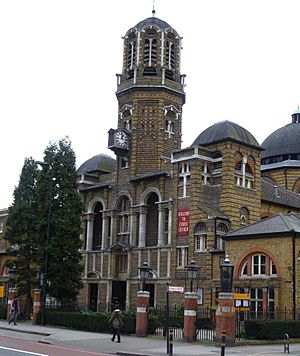Christ Church, Brixton Road facts for kids
Quick facts for kids Christ Church, Brixton Road |
|
|---|---|
| Christ Church, North Brixton | |

Photo of the church
|
|
| Location | 96 Brixton Road, London SW9 6BE |
| Country | United Kingdom |
| Denomination | Church of England |
| History | |
| Founder(s) | Rev William Mowll |
| Architecture | |
| Architect(s) | Arthur Beresford Pite |
| Style | Neo-Byzantine |
| Years built | 1899 - 1902 |
| Administration | |
| Parish | Brixton Road |
| Diocese | Anglican Diocese of Southwark |
Christ Church on Brixton Road is a beautiful and historic church located in Lambeth, London. It was built in 1902 by a famous architect named Arthur Beresford Pite. He designed it for his brother-in-law, Rev William Mowll. The church has a special look, mixing Art Nouveau and Byzantine Revival styles. It is also a Grade II* listed building, meaning it's very important and protected.
The first stone for the new church was placed on December 13, 1898, by Princess Helena. The old church building was taken down in 1899. The new church was officially opened on December 5, 1902, by Edward Talbot, who was the Bishop of Rochester. You can see a large clock on the outside of the church. There is also an outdoor pulpit, which is a raised platform for speaking, added in 1907.
Contents
History of Christ Church
From Chapel to Church
The Christ Church building you see today stands on the same spot as an older chapel. This earlier building was known as the Holland Chapel. It was an independent chapel, meaning it wasn't part of the main Church of England at first.
In 1835, the Holland Chapel was sold to the Anglicans, who are part of the Church of England. It was then made bigger and renamed "Christ Church" in 1855. This shows how the site has been a place of worship for a long time.
Building the New Church
The current church building was constructed between 1899 and 1902. Before the main church was finished, a new church hall was started. Its foundation stone was laid on July 24, 1897. This hall was completed in 1899, just before the main church building.
The foundation stone for the new church itself was special. It was designed by Edward Johnston and carved by Eric Gill in 1902. These were both very skilled artists of their time.
Special Features of the Church
Stained Glass Windows
Christ Church has five beautiful stained glass windows. These windows tell stories using colorful pieces of glass. One of them shows Saint Paul preaching to the Athenians. This particular window is very old and was actually in the previous church building.
The other four windows were made by a company called Clayton & Bell. They include:
- The Good Samaritan, a story about helping others.
- A pair of windows showing the Sacrifice of Isaac and Hannah presenting her son Samuel to Eli. These are stories from the Bible.
- The Resurrection, which shows Jesus rising from the dead.
Church Organs
The church has a history with different organs, which are large musical instruments. The first organ was made by A. Hunter & Son. It was in the older church and then moved to the new one in 1902. However, this organ was later moved to St Osmund's Church, Derby.
In 1919, a new organ was installed. This one was made by Henry Willis & Sons, a famous organ builder. More recently, in 2007, a digital organ was added. This means the church has both traditional and modern musical instruments.
Café van Gogh
Inside a newer part of the church, you'll find a place called Café van Gogh. This café is named after the famous painter Vincent van Gogh. He lived nearby for a short time at a house called 87 Hackford Road.
Today, that house has a Blue plaque on it, which is a special sign showing that a famous person lived there. The house is also open for visitors to see. The café is a nice way to remember the artist's connection to the area.

